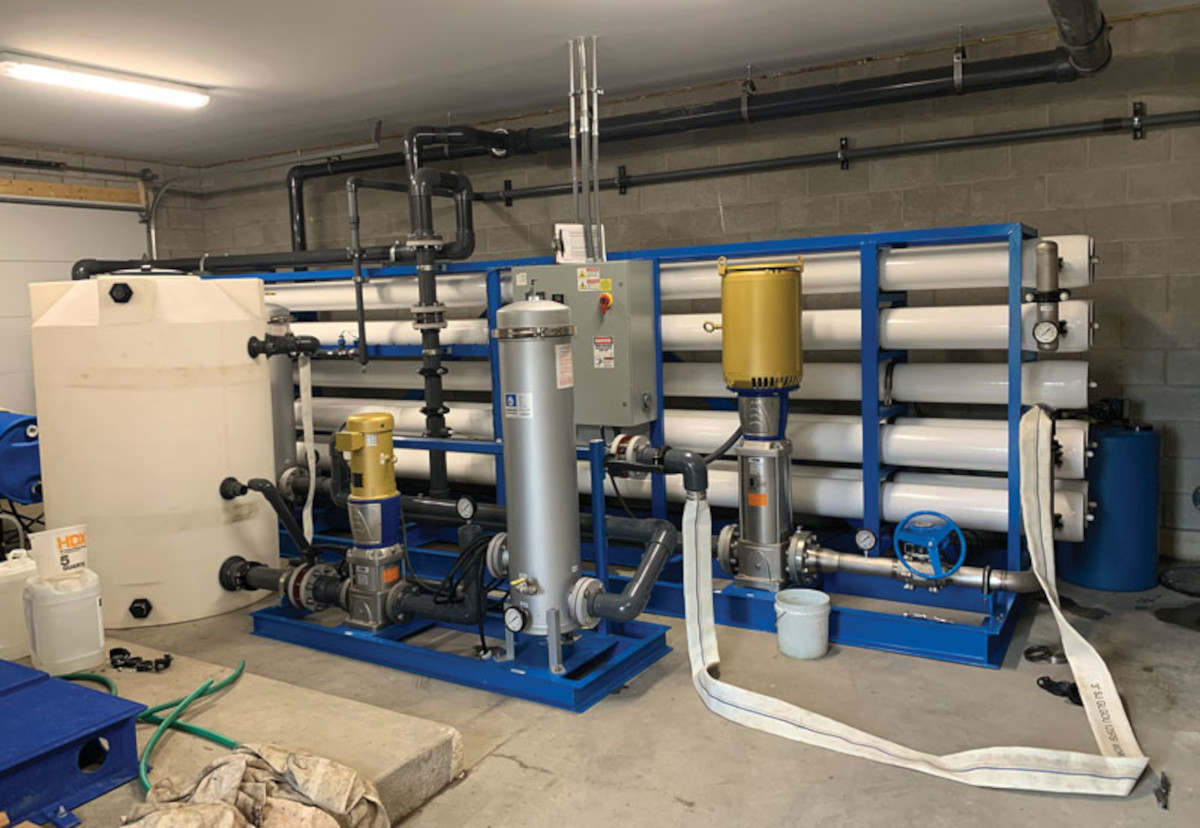- 24 Hr. Support
- RO System Design
- RO System Installation (Standard/Custom)
- RO Membrane Cleaning
- Ion Exchange Regeneration
- Remote Monitoring
What is Reverse Osmosis?
Reverse osmosis (RO) is a water purification process, often important in industrial water treatment, that forces water through a semi-permeable membrane to remove dissolved salts, minerals, and other impurities. By applying pressure to the source water, the RO system separates clean water molecules from contaminants, which are then flushed away as waste. In tandem with RO, ion exchange actively removes specific dissolved ions by swapping them with more desirable ones using specialized resins, enhancing overall water quality. This combined approach produces purified water suitable for sensitive applications. Industrial reverse osmosis systems use these principles on a larger scale to support manufacturing, food processing, and pharmaceutical operations where consistent water quality is critical.

Benefits of Reverse Osmosis
- Improves Taste and Odor
- Alkalinity Reduction
- Removes pollutants
- Improves Efficiency of Industrial Applications
- Reduces Water Treatment Operating Costs
Industrial Reverse Osmosis Filtrations Systems
Industrial reverse osmosis (RO) systems serve a critical role in several industries by actively delivering clean, purified water. The pharmaceutical industry depends on RO to produce ultrapure water essential for drug formulation and sterilization, ensuring product safety and compliance. In the food and beverage sector, manufacturers use RO to consistently remove impurities and control mineral content, which helps maintain flavor and quality standards. These industries choose RO not only for its effectiveness but also for its cost efficiency. RO systems reduce chemical usage and require less system maintenance, minimizing operational downtime. Unlike other systems, which demand frequent resin bed cleaning and replacement, RO systems offer a more streamlined and economical solution for industrial water purification.
Applications of Reverse Osmosis
Industrial reverse osmosis (RO) systems play a critical role in industries that demand purified water. Pharmaceutical companies use RO systems to ensure clean water for drug production and equipment sterilization. Electronics manufacturers rely on them to prevent contamination during component fabrication. In the food and beverage industry, RO systems help maintain product consistency and meet hygiene standards. These systems support quality, safety, and efficiency across essential operations.
Industries That Rely on Industrial Reverse Osmosis Systems:
- Microelectronics
- Hydroponics Farming
- Mining
- Power Plants
- Hospitality
- Medical Facilities
Designs of Reverse Osmosis Systems
Reverse osmosis (RO) systems actively purify water by forcing it through a thin, semi-permeable membrane that blocks suspended and dissolved impurities, including salts, chemicals, and pollutants. This membrane allows only water molecules to pass, effectively separating contaminants from clean water. Although all RO systems use this core process, they differ based on the intended application. Factors like flow rate, the number of filtration stages, membrane type, and pump pressure directly influence how efficiently an RO system performs.
Flow
The flow of a reverse osmosis (RO) system refers to how quickly it filters water. High-flow RO units deliver large volumes of purified water each day, making them ideal for applications that demand a constant and substantial supply. In contrast, low-flow systems produce much smaller amounts, which may suit occasional or limited use. You determine the appropriate flow rate by assessing how much purified water you need daily—ensuring your system meets your specific usage needs efficiently.
Membrane Types & Stages
Most RO systems use a semi-permeable membrane to remove contaminants, but they also include additional filtration stages that further purify the water and shield the membrane from larger debris. Manufacturers typically design RO systems with three, four, or five filtration stages. Each stage represents a separate filter or membrane that the water passes through during purification. As the number of stages increases, the system enhances its ability to remove a broader range of impurities, offering more thorough filtration tailored to different water quality needs.
A three-stage reverse osmosis system features the following filters:
- The sediment filter captures larger particles like dirt and rust suspended in the water.
- The carbon filter removes chlorine, volatile organic compounds (VOCs), and other smaller contaminants.
- The semi-permeable RO membrane eliminates nearly all of the remaining impurities.
Pump Pressure
Applications that require RO systems to filter highly concentrated solutions demand greater pump pressure. These solutions contain more contaminants, so the system must apply higher pressure to push the feed water effectively through the filtration stages and the semi-permeable membrane. When the water has fewer impurities, the system uses less pump pressure because the water flows through the membrane more easily. By adjusting the pressure to match the level of contamination, you ensure the RO system operates efficiently and delivers optimal purification.
Engineered H2O Solutions Designs, Installs, Monitors, and Supports Industrial Reverse Osmosis Systems
Engineered H2O Solutions designs, installs, and supports a wide range of industrial reverse osmosis (RO) systems, including advanced high-recovery closed circuit reverse osmosis (CCRO) technology. Our team works closely with clients to build systems that meet their specific commercial & industrial water treatment needs, and we provide 24/7 RO system maintenance and technical support to keep operations running smoothly. Whether you’re upgrading an existing system or launching a new facility, we deliver reliable, responsive RO system maintenance.
Request a Quote Today!
Call 1-(216)-346-0919 today to get a quote and take the next step in RO system design, RO system installation, maintenance plan, or supporting your industrial reverse osmosis system for you industrial water treatment needs.